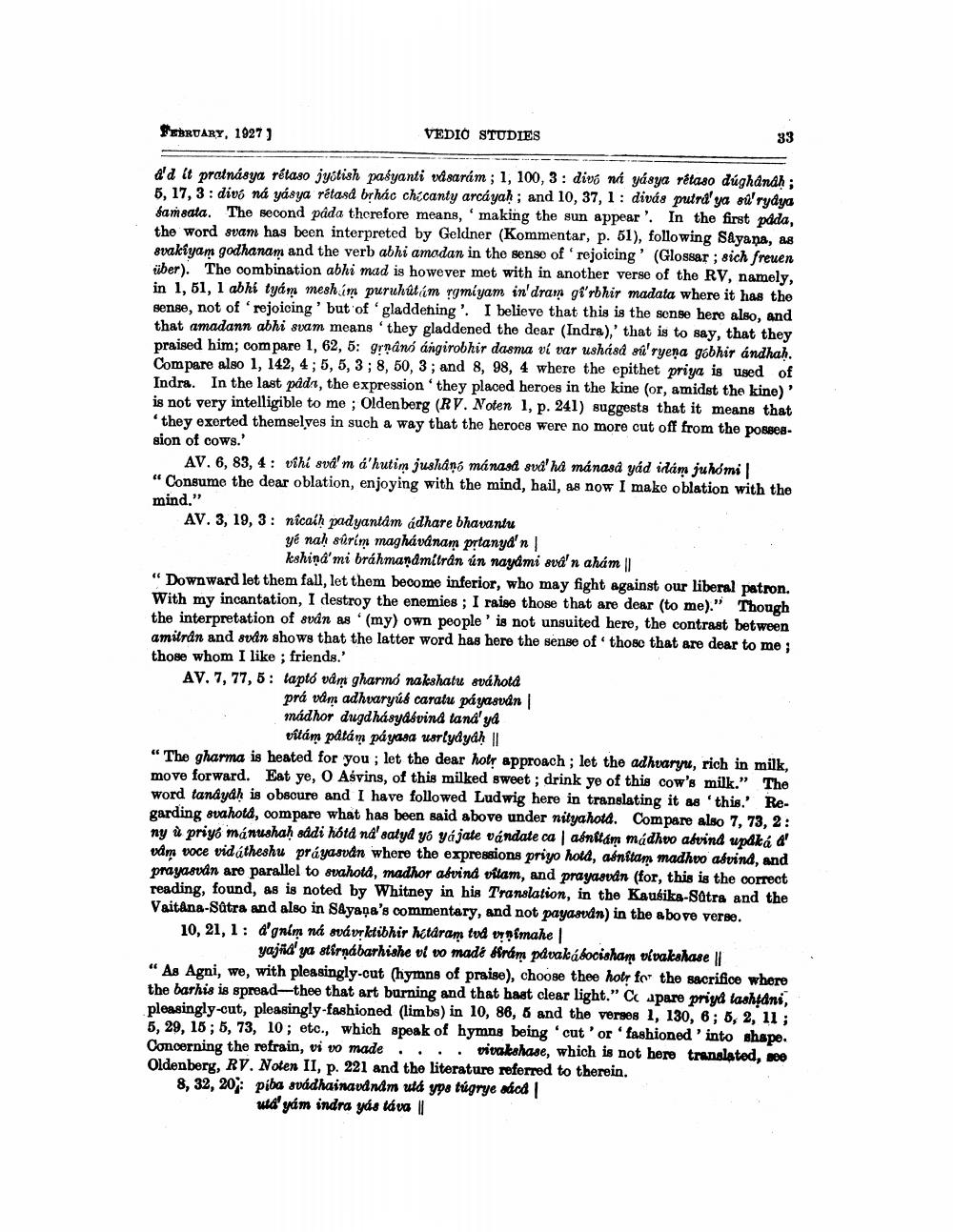________________
SERRUARY, 1927)
VEDIO STUDIES
33
a'd it pratnásya rétaso jyotish paśyanti udsarám; 1, 100, 3: divo ni yásya rétaso dúghandh ; 5, 17, 3: divó ná yásya rétasd brhác chicanty arcáyah ; and 10, 37, 1: divás pura ya su rydya sansata. The second pada therefore means, making the sun appear'. In the first padda, the word svam has been interpreted by Geldner (Kommentar, p. 51), following Såyana. 28 svakiyam godhanam and the verb abhi amodan in the sense of rejoicing' (Glossar ; sich freuen über). The combination abhi mad is however met with in another verse of the RV, namely, in 1, 51, 1 abhi tyán meshim puruhůtam rgmiyam in' dram gi'rbhir madata where it has the sense, not of rejoicing' but of 'gladdening'. I believe that this is the sense here also, and that amadann abhi suam means 'they gladdened the dear (Indra),' that is to say, that they praised him; compare 1, 62, 5: ginanó ángirobhir dasma vi var usháså sú ryena gobhir ándhah. Compare also 1, 142, 4; 5,5, 3; 8, 50, 3; and 8, 98, 4 where the epithet priya is used of Indra. In the last pada, the expression they placed heroes in the kine (or, amidst the kine)' is not very intelligible to me ; Oldenberg (RV. Noten 1, p. 241) suggests that it means that
they exerted themselves in such a way that the herocs were no more cut off from the possession of cows.'
AV. 6, 83, 4 : vihí svá'm á'hutim jushani mánasd sva' ha mánasa yád idám juhómi! "Consume the dear oblation, enjoying with the mind, hail, e now I make oblation with the mind." AV. 3, 19, 3: nicaih padyantâm ádhare bhavantu
yé nah sûrim maghávánam prtanya'n!
kshina' mi bráhmandmltrán ún naydmi svd' n ahám || " Downward let them fall, let them become inferior, who may fight against our liberal patron. With my incantation, I destroy the enemies ; I raise those that are dear (to me)." Though the interpretation of sván as '(my) own people' is not unsuited here, the contrast between amitran and svdn shows that the latter word has here the sense of those that are dear to me; those whom I like; friends.' AV. 7, 77, 5: taptó vám gharmó nakshatu svá hotd
prá vám adhuaryús caratu páyasvin madhor dugdhásydávind taná' ya
vítám pátám páyasa usrlydyah || "The gharma is heated for you ; let the dear hotr approach ; let the adhvaryu, rich in milk, move forward. Eat ye, O Asvins, of this milked sweet ; drink ye of this cow's milk.” The word tanáydh is obscure and I have followed Ludwig here in translating it as 'this.' Regarding svahota, compare what has been said above under nityahota. Compare also 7, 73, 2: ny u priyć mánushah addi hóta nd' satyd yó yájate vandate ca afnftam mádhvo atvind wpdká a' vám voce vid átheshu práyaszán where the expressions priyo hotd, aśnitam madhvo asvind, and pravasván are parallel to svahota, madhor abvind vitam, and prayasudn (for, this is the correct reading, found, as is noted by Whitney in his Translation, in the Kausika-Satra and the VaitAna-Satra and also in SAyaşa's commentary, and not payasudn) in the above verse. 10, 21, 1: d'gnim na svávrktibhir hetaram tud vynimahe
yajid' ya stirnábarhishe vi vo made fram pdvakábocisham vivakshase | "As Agni, we, with pleasingly-cut (hymns of praise), choose thee hot for the sacrifice where the bathis is spread-thee that art burning and that hast clear light." Cc apare priya tashfani, pleasingly-cut, pleasingly-fashioned (limbs) in 10, 86, 6 and the verses 1, 130, 6; 0, 2, 11; 5, 29, 15; 5, 73, 10; etc., which speak of hymns being 'cut' or 'fashioned into shape. Concerning the refrain, vi vo made .... vivakshase, which is not bere translated, noe Oldenberg, RV. Noten II, p. 221 and the literature referred to therein. 8, 32, 20, piba svádhainavdndm utá yps túgrye adica
utá'yám indra yás táva |




